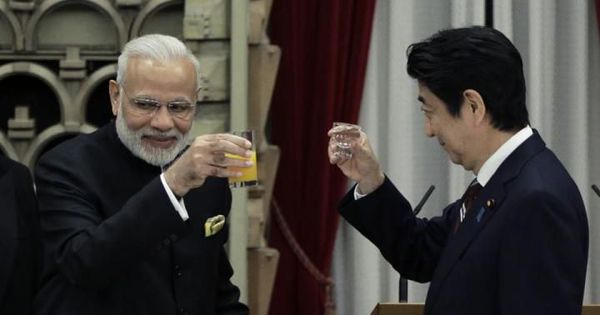Media Report

- Forbes comments: "Xi Jinping's signature foreign policy contribution-The Belt and Road Initiative-has attracted acres of positive press coverage since it was unveiled in 2014, but has lately inspired an apparent rival in the resurrected form of the 'Quadrilateral Security Dialogue' between the U.S., Japan, Australia and India. These four democracies each have their own security concerns about China's more assertive foreign policy posture, but they also have a shared commitment to the existing 'rules based order' as a key mechanism for protecting, and projecting, their own principal security and economic interests. For this reason, it's perhaps incorrect to see the 'Quad' as a rival to the BRI so much as a restatement of what the BRI has set out to challenge."
- The New York Times reports: "There was a time, not so long ago, when a Chinese leader setting himself up as ruler for life would have stirred international condemnation for bucking the global trend toward greater democracy. Now, such an action seems fully in keeping with moves by many countries in the other direction. The surprise disclosure on Sunday that the Communist Party was abolishing constitutional limits on presidential terms - effectively allowing President Xi Jinping to lead China indefinitely - was the latest and arguably most significant sign of the world's decisive tilt toward authoritarian governance, often built on the highly personalized exercise of power. The list includes Vladimir V. Putin of Russia, Abdel Fattah el-Sisi of Egypt and Recep Tayyip Erdogan of Turkey, all of whom have abandoned most pretenses that they rule according to the people's will."
- CNN reports: "One of China's biggest tech companies says it needs to step up efforts to win over US intelligence agencies. ZTE, which makes smartphones and builds mobile networks, must make "more effort to build the trust among the people in Washington," said Lixin Cheng, CEO of the company's mobile devices business. "We need to do more."Top officials from the FBI, CIA and NSA testified before Congress this month that ZTE and Huawei, another Chinese smartphone maker, pose a security threat to American customers. "We understand the concerns, and respect the concerns of different agencies of the United States government," Cheng said in an interview with CNN's Kristie Lu Stout at the Mobile World Congress in Barcelona. "We promise we are going to work very openly, as we did before, [and] transparently to address their needs and their concerns.""
Calendar
- 2018-02-25 The US risks making a strategic blunder over China
- 2018-02-23 China's big conglomerates are no longer buying up the world
- 2018-02-22 Top US Treasury official slams China's 'non-market behavior'
- 2018-02-21 A massive US farming industry fears China trade trouble
- 2018-02-20 China would not be the only country hurt by US steel tariffs
- 2018-02-14 The director of the FBI says the whole of Chinese society is a threat to the US
- 2018-02-13 As China Marches Forward on A.I., the White House Is Silent
- 2018-02-12 Chinese stealth fighters are combat-ready, Beijing says
- 2018-02-11 China pledges 'employment first' policies to create millions of jobs
- 2018-02-09 China draws up trade retaliation options against US
News
- The New York Times With Xi's Power Grab, China Joins New Era of Strongmen
- CNN China's ZTE: We must do more to reassure US officials
- New York Post China not happy with latest US sanctions for North Korea
- CNN President, or Emperor? Xi Jinping pushes China back to one-man rule
- Reuters China sets stage for Xi to stay in office indefinitely
- Financial Times "Emperor" stocks climb as China to end two-term limit on presidency
- The New York Times Trump Trade Sanctions Aimed at China Could Ensnare Canada
- The Wall Street Journal Apple's China Lesson: Think Different, But Not Too Different
- Bloomberg With Daimler Deal, Geely Puts China Flag in German Heartland
- News.com.au China's terrifying and deadly arsenal of weapons
- Financial Times China steel and iron ore futures soar on new pollution curbs
- The Diplomat Why Did China Pull Support for Pakistan at the Financial Action Task Force?
- BBC China warns parents after boy filmed peeing in lift
Commentary
- Forbes The 'Quad' Is Not A Rival To China's Belt And Road Initiative -- It's A Precursor
- The Hill US colleges willfully blind to China's influence
- CNN Why is the world silent about Xi Jinping's power grab?
- TIME China's Lurch Toward One-Man Rule Under Xi Jinping Should Worry Us All
- Financial Review Xi Jinping's power grab reveals the real nature of China's politics
- Forbes Why Apple Will Lose China Market Share In 2018, Despite The Success Of The iPhone X
- The Wall Street Journal Anbang's Rescue Is China's Too-Big-to-Fail Moment